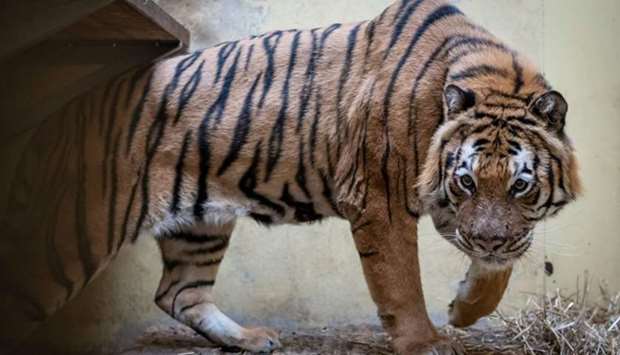Nine stranded tigers whose plight sparked a wave of public sympathy after they were found emaciated and dehydrated during an odyssey from Italy are slowly recovering after their rescue by two Polish zoos.
The tigers endured a gruelling journey through Europe last month during which a tenth feline died.But seven are now eating and have received vitamins and mineral salts at one of the zoos in Poznan, western Poland, an AFP photographer reported after a Friday visit.
Poznan zoo workers said the three males and four females are still stressed and aggressive and currently eating only half their customary five to six kilos daily diet of beef and horsemeat.
Vets say the amount must be increased only incrementally after the animals endured several days with no food at all.
Two others were housed in another zoo and are in a better condition.
The zoos took them in after animal lovers started a fund to create a refuge for animals in distress which Poznan will host.
They hope to raise 1.4 million euros ($1.6 million) and have gathered around a quarter of that sum by Saturday.
Polish authorities said last week they had charged two Italian truck drivers and a Russian man believed to have organised the journey with animal abuse after a truck that set off from Italy on October 22 carrying the tigers got stuck for days on the border with Belarus.
They were said to be bound for a zoo in the southern Russian republic of Dagestan.
The truck drivers remain in Polish detention and their lorry has been impounded.
It remains unclear who owns the animals -- the head of a breeding facility in Rome or the owners of the Dagestan zoo which was due to receive them as a gift.
A Poznan zoo spokesman said it was out of the question for the tigers to be sent to either and that they would ultimately be transferred to a special facility in Spain run by Dutch association Animal Advocacy and Protection.
The Poznan zoo had described the tigers as "emaciated, dehydrated, with sunken eyes, excrement stuck to their fur, urine burns, in a total state of stress, without the will or desire to live" when they were discovered.
According to animal rights organisations, only between 3,200 and 3,900 tigers live in the wild around the world.
Another 7,000 are held in captivity, mainly in Asia.

